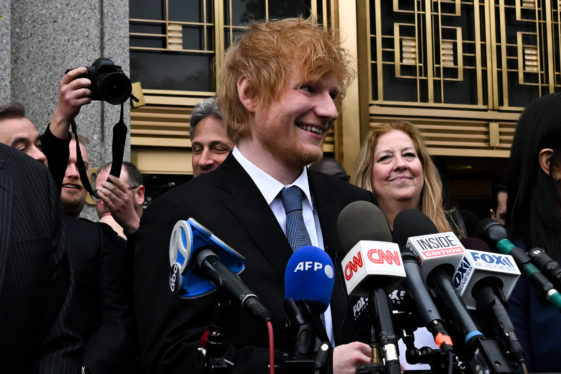Ed Sheeran is on a legal winning streak.
Less than two weeks after the star singer won a blockbuster trial over whether his “Thinking Out Loud” infringed Marvin Gaye’s “Let’s Get It On,” a federal judge has dismissed a second, closely-related copyright case accusing him of copying the same iconic song.
U.S. District Judge Louis Stanton had ruled last fall that Sheeran would need to face a jury trial in the second case, just like he did in last month’s showdown in Manhattan federal court. But on Tuesday (May 16), the judge issued a surprise decision reversing himself and dismissing the case without a trial.
The reason? The judge said he could rule himself, without the help of a jury, that the combination of simple elements that Sheeran allegedly stole (a chord progression combined with a harmonic rhythm) was not unique enough to be covered by copyright law in the first place.
“It is an unassailable reality that the chord progression and harmonic rhythm in ‘Let’s Get It On’ are so commonplace, in isolation and in combination, that to protect their combination would give ‘Let’s Get It On’ an impermissible monopoly over a basic musical building block,” Judge Stanton wrote, echoing the arguments that Sheeran’s attorneys made throughout last month’s trial.
Sheeran has spent years defending himself over “Thinking Out Loud.” Though the song was a commercial and critical success — it hit No. 2 on the Hot 100 before winning a Grammy award for song of the year — critics and the public quickly noticed similarities with “Let’s Get It On,” with one reviewer calling it an “incredibly obvious successor” to Gaye’s famed slow jam.
Sheeran was first sued by the heirs of Ed Townsend, who co-wrote “Let’s Get It On” with Gaye. It was that long-running case that last month culminated in a high-profile trial in Lower Manhattan, which featured passionate arguments from both sides and saw the singer himself playing the guitar from the witness stand. On May 4, the jurors returned a verdict that Sheeran and his co-writer Amy Wadge had not infringed the earlier song, clearing the star of millions of dollars in potential damages.
But even following that verdict, Sheeran was still facing another case filed by Structured Asset Sales, an entity owned by industry executive David Pullman that owns a separate one-third stake in Townsend’s copyrights. Last October, Judge Stanton ruled in that case that the pop star would need to face a jury of his peers. The judge said there was “no bright-line rule” for deciding whether Gaye’s selection and arrangement of common musical elements were creative enough to warrant copyright protection.
But on Tuesday, less than two weeks after the big verdict in the other case, Judge Stanton made the rare legal decision to “reconsider” his own ruling to send the case to trial.
Among other things, the judge cited the fact that the same combination of chords and harmonic rhythm had appeared in at least four other songs before “Let’s Get It On” was even released, including “Get Off Of My Cloud” by The Rolling Stones and “Georgy Girl” by The Seekers.
“Multiple songwriters have combined the two commonplace elements in the same manner for years,” Judge Stanton wrote. “If their combination were protected and not freely available to songwriters, the goal of copyright law … would be thwarted.”
The judge also cited a recent ruling that dismissed a case against Donald Glover over the Childish Gambino song “This Is America” on similar legal grounds, suggesting that the decision had changed the case law on how federal courts assess such combinations of unprotectable elements.
“To prevent manifest injustice, defendants’ motion for reconsideration is granted,” Judge Stanton wrote. “The Clerk of the Court is directed to close the case.”
In a statement to Billboard following the ruling, Sheeran’s lead attorney Donald S. Zakarin said his team and his client were “truly pleased” with the outcome: “Judge Stanton concluded that Ed Sheeran and Amy Wadge did not infringe, a conclusion consistent with the jury determination that Ed and Amy independently created Thinking Out Loud. This is an important victory not only for Ed and Amy and all songwriters but also for the music loving public.”
Though Tuesday’s ruling is a key victory for the pop star, it’s not the end of the road for the “Thinking Out Loud” litigation. Both the verdict earlier this month and the new ruling can still be appealed, which could take years to resolve. And Structured Asset Sales is also pursuing a third, more novel case based on a different copyright covering Gaye’s more famous recorded version of the song.
In an interview with Billboard following the ruling, Pullman said his company would appeal Tuesday’s decision on multiple grounds. And he stressed that he would continue to litigate the third case, which has been paused while the other cases played out.
“In the new case, in front of a different judge, we have the sound recording in that case,” Pullman said. “Through all these years of litigation, the one thing the defendants have been petrified of is the sound recording. They don’t want to play it for the jury, because then they would see the similarities.”
https://www.billboard.com/pro/ed-sheeran-wins-second-lets-get-it-on-lawsuit/



